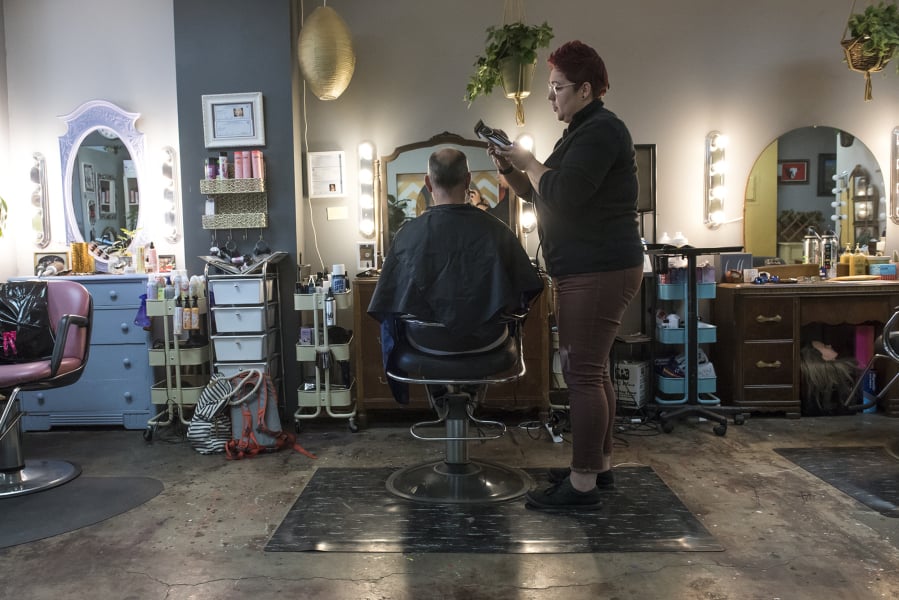After Christina Carlsson heard about Senate Bill 5326 last month, she said she had a solid week of not sleeping.
Carlsson is the owner of Marquee Salon + Studio, located in Vancouver’s Arts District, and the bill, presented as a “tax fairness” proposal, would have upended the business model she and others across the state rely on.
Carlsson and others were given some relief on Thursday when the bill’s sponsor, Sen. Karen Keiser, D-Kent, announced that she was dropping the legislation after receiving strong pushback from hairstylists and cosmetologists across the state.
The legislation was part of a package of bills looking at the broader issue of defining which workers are independent contractors, who have more freedom but fewer protections, and which are employees, who are subject to the state’s labor laws.
Although the bill is dead, Shelby Oxley, an independent contractor who rents space at Marquee Salon + Studio, said that she’s still concerned about how other bills could affect her work.
“It’s still kind of muddy for us,” she said.
‘Unintended consequences’
In Washington, many cosmetologists, hairstylists and estheticians rent space from a salon owner as independent contractors. They can set their own hours and attract their own clientele but are required to pay their own business and occupation taxes.
Keiser’s bill sought to address what she said were inequities between independent contractors and salon owners. Speaking at a hearing on SB 5326 (co-sponsored by Sen. Ann Rivers, R-La Center) earlier this week, she described a situation where a salon owner directly employed six hairstylists, each of whom generated $50,000 a year in sales. In that case, the salon owner would have to pay taxes on the $300,000 in revenue.
She said a salon owner could instead rent out booths to six hairstylists. If each of their incomes is under $56,000, they’d be exempt from the state’s business and occupation tax. She said that not a penny of taxes would be generated from the same activities from hairstylists classified as independent contracts. She said she was prompted to introduce the bill after being contacted by a salon owner who called her attention to the situation.
The bill sought to remedy the situation by removing exemptions for cosmetologists from requirements for unemployment insurance, workers’ compensation and the business and occupation taxes.
Although Keiser removed provisions that would have banned renting booths and expanded its other requirements to barbers, she pulled the legislation after hairstylists from across the state packed a committee room in Olympia to oppose the bill.
“As a legislator, it is my responsibility to listen when people tell me something is wrong and to thoughtfully make sure any legislative proposal achieves its intended goals without causing unintended consequences,” said Keiser in a press release announcing the bill had been pulled. “Thanks to your outreach, it was made clear that this bill fell short of those requirements.”
Carlsson said that although her name is on the lease for Marquee Salon + Studio, she doesn’t like to think of herself as “owner.” Instead, she thinks of the business as a “collective” where she is one of six stylists who chip in to pay the rent. She said they have regular dinners to discuss managing the studio. She said that the bill would have made the arrangement unfeasible.
“What, am I going to go work at Supercuts?” she said.
Oxley said she has her own shears, brushes, combs and hair colors. A former school counselor, Oxley said she pays $485 a month for space at the studio. She said she likes the flexibility in her hours and can customize her services, even offering beard trims or blowouts.
“I have some crazy ideas, so let’s do it,” she said with a laugh.
Contractors or employees
Oxley said that while she was glad SB 5326 was withdrawn, she will still be closely watching SB 5513.
That bill is intended to clarify the definitions of an independent contractor and an employee. It creates penalties for businesses that improperly classify employees to get around taxes and worker protections.
The bill was heard along with SB 5326 on Monday by the Senate Labor and Commerce Committee. During the hearing, Mia Kelly, representing Working Washington, complained about how companies abuse and underpay workers by improperly classifying them as independent contractors.
Bob Battles, director of government affairs for the Association of Washington Business, said that the bill could create problems for salon owners who work as hairstylists while also renting out space at their businesses. He also complained the bill was too heavy-handed, and the state hadn’t studied the issue.
“This appears to be trying to use, like, an A-bomb to try and hunt for rabbits,” he said.
Oxley pointed to a provision in the bill that establishes tests to determine if a worker is an independent contractor. One test is if the worker’s services are outside the usual course of business. She said that this provision could affect her work.
She said the demise of SB 5326 made clear: advocacy works.




